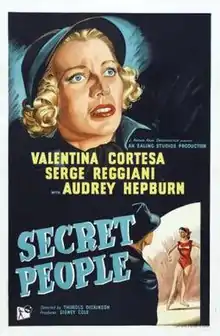| Secret People | |
|---|---|
 Original UK poster | |
| Directed by | Thorold Dickinson |
| Written by | Thorold Dickinson Wolfgang Wilhelm Joyce Cary Christianna Brand |
| Produced by | Sidney Cole |
| Starring | Audrey Hepburn Valentina Cortese Serge Reggiani Charles Goldner |
| Cinematography | Gordon Dines |
| Edited by | Peter Tanner |
| Music by | Robert Gerhard |
Production company | |
| Distributed by | General Film Distributors |
Release date |
|
Running time | 96 minutes |
| Country | United Kingdom |
| Language | English |
| Box office | £60,000[2] |
Secret People is a 1952 British drama film, directed by Thorold Dickinson and produced by Sidney Cole for Ealing Studios, with a screenplay from Thorold Dickinson, Wolfgang Wilhelm, Joyce Carey and Christianna Brand. Secret People stars Valentina Cortese, Serge Reggiani and Audrey Hepburn and premiered in the U.K. on 8 February 1952. The film provided Audrey Hepburn with her first significant film role, leading to her big breakthrough in Roman Holiday.
Plot
In 1930, Maria Brentano and her younger sister Nora flee to London as their father is about to be executed by his country's dictator. Seven years later, Maria unexpectedly meets Louis, her childhood sweetheart, who is engaged in a plot to assassinate the dictator. Maria is persuaded to play an active part in the plan, but it all goes horribly wrong when the bomb they plant kills an innocent waitress, causing Maria much distress.
Cast
- Valentina Cortese as Maria Brentano
- Serge Reggiani as Louis Balan
- Audrey Hepburn as Nora Brentano
- Charles Goldner as Anselmo
- Michael Shepley as Manager of the British Pavilion
- Angela Fouldes as Nora (as a child)
- Megs Jenkins as Penny
- Irene Worth as Miss Jackson
- Reginald Tate as Inspector Eliot
- Norman Williams as Sergeant Newcombe
- Athene Seyler as Mrs Reginald Kellick
- Sydney Tafler as Syd Burnett
- Geoffrey Hibbert as Steenie
- John Ruddock as Daly
- Michael Allan as Rodd
- John Field as Fredor Luki
- Charlie Cairoll as themselves (clowns)
- Hugo Schuster as General Galborn
- Lionel Harris as Frack
- Rollo Gamble as Bentley
- John Penrose as Bill
- John Chandos as John
- Michael Ripper as Charlie
- Yvonne Coulette as Woman on London Committee
- Louis Mansi as Member of Paris Committee
- John Gabriel as Member of Paris Committee
- Olga Landiak as Member of Paris Committee
- Frederick Schiller as Galbern's Bodyguard
- Gaston Richer as Queval
- Derek Elphinstone as Plain Clothes Man
- Edward Evans as Plain Clothes Man
- Jack McNaughton as Postman
- Ingeborg von Kusserow as Shoe Shop Girl
- Bob Monkhouse as hairdresser
- Sam Kydd as Detective Sergeant
Audrey Hepburn
After having appeared in a string of bit parts and small speaking roles, the film provided Audrey Hepburn with her first significant film role, leading to her big breakthrough in Roman Holiday: on 18 September 1951, shortly after Secret People was finished but before its premiere, Thorold Dickinson made a screen test with the young starlet and sent it to director William Wyler, who was in Rome preparing Roman Holiday. Wyler wrote a glowing note of thanks to Dickinson, saying that "as a result of the test, a number of the producers at Paramount have expressed interest in casting her."[3]
Release
Although finished before August 1951 (the film was screened by the BBFC censors on 7 August 1951[4]), it didn't premiere at Odeon Leicester Square in London until 8 February 1952.[1]
Reception
The film reviewer for The Times found Secret People to be "a confused, inarticulate, disappointing film, neither as imaginative nor as intellectually exciting as it should be."[5]
In contrast, George Perry wrote in Forever Ealing that "...there is much of interest in the Ealing film, such as the moral dilemma of those who have to resort to force to overcome force." He also praised "a sensitive performance by Valentina Cortesa, ...a substantial role for Audrey Hepburn", and felt that the film had been misinterpreted and "was in some respects ahead of its time."[6][7]
The film was a box office flop.[2]
References
- 1 2 The Times, Friday 8 Feb. 1952, page 2, col. 1: Opera And Ballet - Picture Theatres. Retrieved 2015-04-20
- 1 2 Harper, Sue; Porter, Vincent (2003). British Cinema of The 1950s The Decline of Deference. Oxford University Press USA. p. 285.
- ↑ BFI Film Forever, 22 January 2014: The letter that made Audrey Hepburn a star. Retrieved 2015-04-20
- ↑ BBFC: Secret People (1951). Retrieved 2015-04-20
- ↑ The Times, Monday 11 Feb. 1952, page 2: New Films in London - A plot with ideas. Retrieved 2015-04-20
- ↑ Forever Ealing by George Perry, Pavilion Books and M.Joseph 1981 - ISBN 9780907516064
- ↑ "Britmovie.co.uk - Secret People". Retrieved 2015-11-14